All pincushion mass and white-hot rage await the bull, panting. My mother, a small figure in a black catsuit and high-heeled boots, steps into the arena. The forcado who threw his haughty gauntlet at the middle-aged men sitting in the stands of Campo Pequeno – never expecting a taker – hands over his cape. My mother awkwardly waves the bright pink silk. The bull lowers his head. I squeeze my eyes shut.
It’s 1979, I’m twelve, and this is my first holiday abroad, as I attend an advertising industry jamboree to which my father has been invited in Lisbon. This moment – a private bullfight organized for the delegates (none of whom expected any of the women to enter the ring) – is one of a number that will mark a kind of coming of age, my own Age of Discovery in a city that has a monument for it.
Before that, memories are fragments, small shards that barely illuminate my childhood. But during those ten days in May I keep a series of memories that I can recall more than forty years later. Of course, traveling will do that.
According to psychologist and behavioral economist Daniel Kahneman, each of us has a ‘remembering self’ and an ‘experiencing self’. The experiencing self knows only the psychological present – millions of opportune moments that leave little or no trace. It is the experiencing self that answers the question, “Does this hurt?” Whether the answer matters is determined by the remembering self, the one who evaluates which moment is worth remembering.
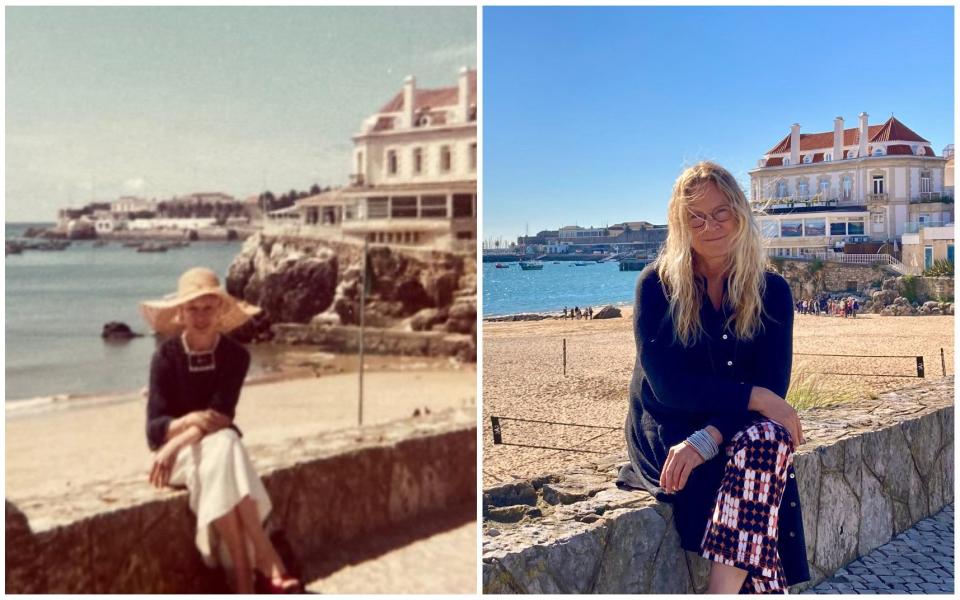

Kahneman describes our remembering self as the inner storyteller, who not only manages the story of the past but also guides us into a future based on the expectation of creating new memories. This is exactly why we like to go on holiday, Kahneman explains. People want a life with good stories. Or at least interesting.
I can’t remember what difficulty my father had breathing during the long flight to Lisbon, but I can see him lying upright in his five-star hotel bed, the oxygen tank an oddity in the otherwise elegant room. The Portuguese doctor says with unobtrusive foresight that he will soon be dead if he doesn’t stop smoking.
Maybe I had heard the word before, but now it is printed: emphysema. Fingers yellowed from years of tamping his pipe are scattered across white sheets; tubes running out of his nose like silicone snot. It’s a complicated mix: disgust and shame.
He is recovering, at least sufficiently, to attend the conference. While the men talk about market share and sales proposals, the women are taken on trips in and around Lisbon. The palaces of Sintra, especially the Pena Palace – the bright yellow Moorish turrets and domes decorated with icing on a beautiful pastry – evoke nothing short of awe in my parochial eyes.
Then the conference ends and there are only three of us left. We revisit the sights of Lisbon and take photos from the ramparts of Castelo de São Jorge; the monochrome swirl of Cascais’ beautiful cobbled streets. We eat lobster and Portuguese seafood rice. We are a happy family for the last time.
When I finally return to Portugal, I will be 56, two years older than the age at which my father died. My husband and I check into Hotel das Amoreiras, a jewel box of a hotel overlooking the Jardim das Amoreiras, an oasis shaded by ginkos and maples, yet within walking distance of the bustling bars and restaurants of Principe Real.
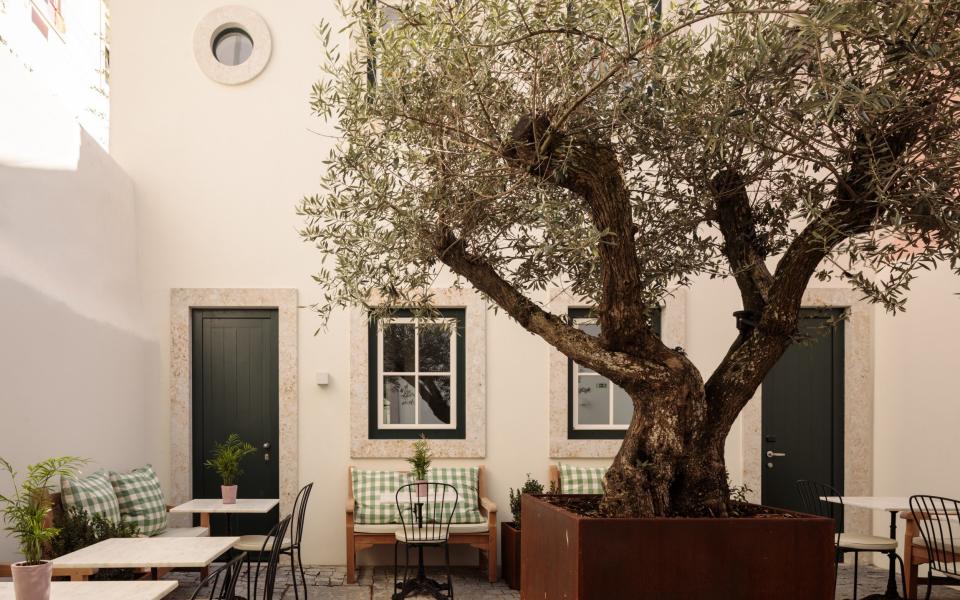

In my handbag there is an envelope with faded photos; May 1979 was scrawled on the back of each one in my mother’s handwriting. These will be my guide: I will revisit all the places where we posed, trying to reach a remnant of the gauche girl in the photos, dead to me as my father.
Lisbon is not the first city I have searched for traces of the young girl I no longer remember. Johannesburg is the city I grew up in, but the City of Gold is pure palimpsest, the past perpetually erased by the present, a constant reminder that prosperity does not equal progeny. And why should it, if prosperity is not shared. Decline there is a kind of social justice.
Lisbon, on the other hand, is booming – and not just because the Portuguese economy is the strongest in decades. The city carries its heritage well, without fuss, people living their lives – as short as butterflies – under the Gothic arches of the 16th-century Mosteiro dos Jerónimos, or climbing the limestone steps in the Torre de Belém. Even the views – from Miradouro da Nossa Senhora do Monte to the sunken arches of the Se Cathedral, which come into view from tram 28 – are virtually unchanged.
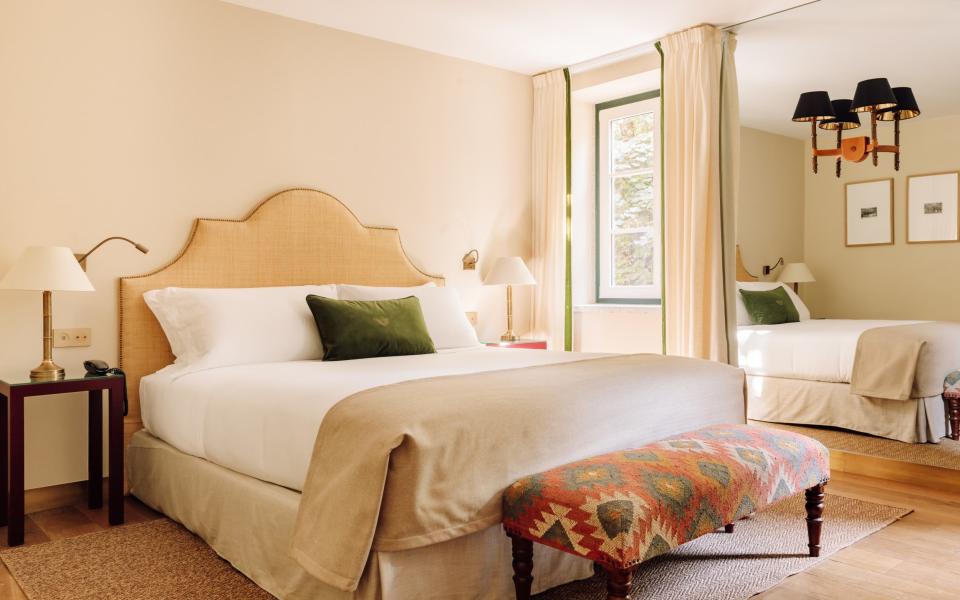

In Cascais I find O’Pescador, the restaurant we visited several times in 1979. I show the waiter a photo of my father and me standing at the entrance. The sign has changed, the sidewalk has been widened into a pedestrian street, but the facade is the same.
He hands it over to a burly man with a fat watch sitting in the corner – the second-generation owner would have been about my age when I last ate at his father’s restaurant. He sends the photo back with a glass of 30 year old tawny port. We toast each other in silence. “Don’t wait another forty years before coming back,” he shouts as I leave.
In the marble foyer of the Palácio Estoril I meet the silver-haired manager on duty, Jose Diogo. Incredibly, Jose has been working at the hotel since 1964; would have been here in May. He smiles at my excitement, seemingly unfazed by a middle-aged woman searching for the past in a hotel that has hosted European royal refugees and “a nest of spies,” including Ian Fleming, who stayed here in 1941.
In the name of research, I down Fleming’s favorite martini as Jose explains that nothing has ever changed in the wood-paneled bar, then follow him into a high-ceilinged reception room where breakfast was served in the 1970s, while chandeliers dangled like giant grapes over tables laden with pastries that we stole for lunch, then to the pool, huge as I remember.
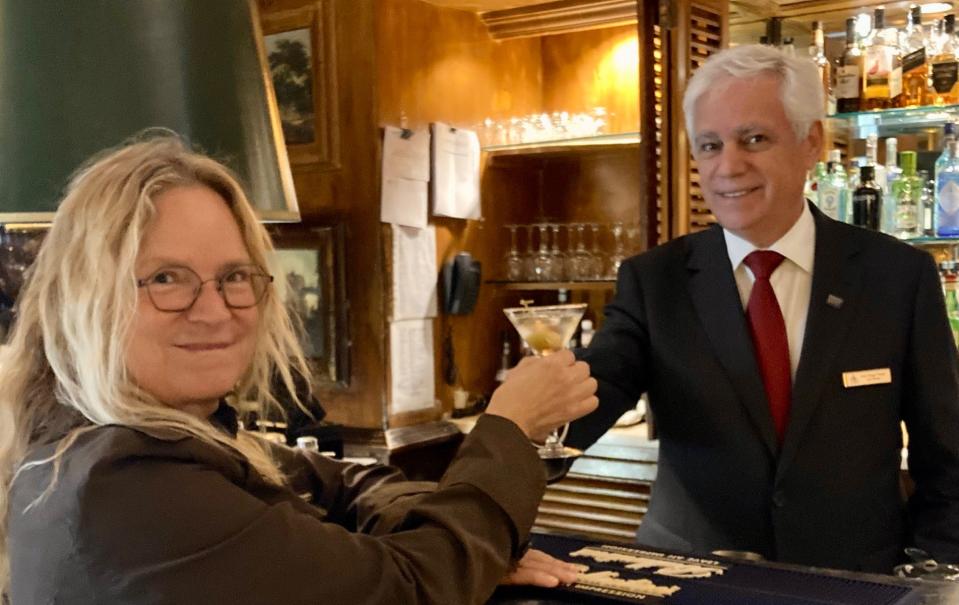

We spent the last few days of the conference here, my mother and I, avoiding further excursions. She had escaped the arena unscathed, but the display of courage separated her from the delegates’ wives, perhaps jealous of their husbands’ admiration.
On our last evening in Lisbon, my husband and I dine at Brilhante (00 351 210 547 981), a new restaurant, but even more of an evocation of my past than O’Pescador. My father hated cooking at home – “no choice, and you can’t send it back” – so restaurants were de facto our dining rooms; stand accommodates my first children’s beds.
Upholstered in dark red velvet banquettes, rose gold mirrors with ribbed detailing reflecting a richly textured interior, my father would have loved this louche boudoir.
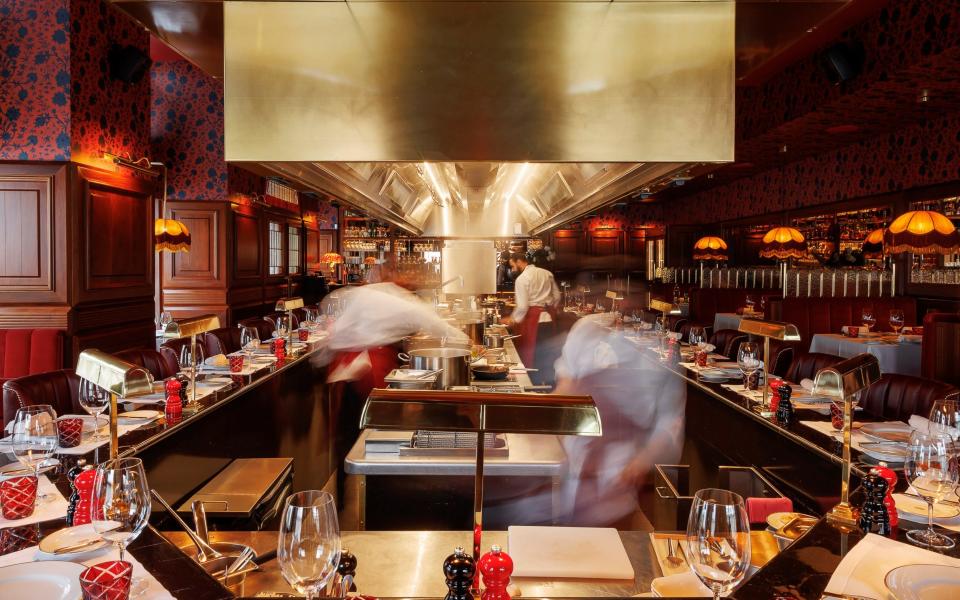

In the center, chefs bend over stainless steel in fierce concentration, beneath pressed ceilings painted oxblood red, oblivious to the audience facing them on leather chairs with brass buttons. The steak, too, has shape: lightly charred on the outside and very, very rare – just the way he liked it.
Under the pools of light from tassel lamps, the red cut glass goblets glitter like jewels. I raise one, drink to the man who shaped me. The photos provided a breadcrumb trail that led me to where we were going, but I still don’t know who he really was.
How to do that
Easyjet flies to Lisbon from Birmingham, Bristol, Edinburgh, Glasgow, Gatwick, Luton and Manchester; Ryanair flies from Birmingham, Edinburgh, Stansted and Manchester; British Airways flies from Heathrow. TAP Air Portugal flies from Heathrow and Manchester. Hotel Das Amoreiras (00 351 211 633 710) has double rooms from €196 per night, including breakfast.